Part 1 | Jehovah’s Witnesses and the Child Abuse Royal Commission
15 December 2019 | Say Sorry
(15 minute read)
Exactly two years ago, on 15 December 2017, the Australian Royal Commission into Institutional Responses to Child Sexual Abuse presented its Final Report to the Governor-General. The report was the culmination of a five-year inquiry into institutional responses to child sexual abuse and related matters.
Some five years earlier, on 12 November 2012, former Prime Minister Julia Gillard, announced that she would recommend to the Governor-General that a Royal Commission be appointed to inquire into institutional responses to child abuse.
Following this announcement, the Terms of Reference were established and then six Commissioners were appointed on 11 January 2013 by Her Excellency Quentin Bryce, Governor-General of the Commonwealth of Australia. The Hon. Justice Peter McClellan AM was the chair of the Child Abuse Royal Commission and worked alongside five other Commissioners, Mr Bob Atkinson AO APM, Justice Jennifer Coate, Mr Robert Fitzgerald AM, Professor Helen Milroy and Mr Andrew Murray.
Fast Facts of the Royal Commission
-
- 42,041 Calls handled
- 25,964 Letters & emails received
- 8,013 Private Sessions held
- 1,334 Personal Written Accounts received
- 3,955 Private Session Narratives published (de-identified)
- 2,575 Referrals to authorities (including police)
- 57 Public Hearings (Case Studies)
- Budget allocated AU$372.8 million
- The public hearing of Case Study 29 into Jehovah’s Witnesses was the most streamed hearing abroad
Case Study 29 into Jehovah’s Witnesses
On 30 June 2015 the Child Abuse Royal Commission announced a public hearing into Jehovah’s Witnesses and Watchtower Bible and Tract Society of Australia Ltd. This public hearing became known as Case Study 29: The response of the Jehovah’s Witnesses and Watchtower Bible and Tract Society of Australia Ltd to allegations of child sexual abuse.
The scope and purpose of the public hearing was to inquire into:
-
-
- The experience of survivors of child sexual abuse within the Jehovah’s Witnesses Church in Australia.
- The response of the Jehovah’s Witnesses Church and the Watchtower Bible and Tract Society of Australia Ltd to allegations, reports or complaints of child sexual abuse within the Church.
- The systems, policies and procedures in place within the Jehovah’s Witnesses Church and the Watchtower Bible and Tract Society of Australia Ltd for raising and responding to allegations of or concerns about child sexual abuse within the Church.
- The systems, policies and procedures in place within the Jehovah’s Witnesses Church and the Watchtower Bible and Tract Society of Australia Ltd to prevent child sexual abuse within the Church.
- Any related matters.
-
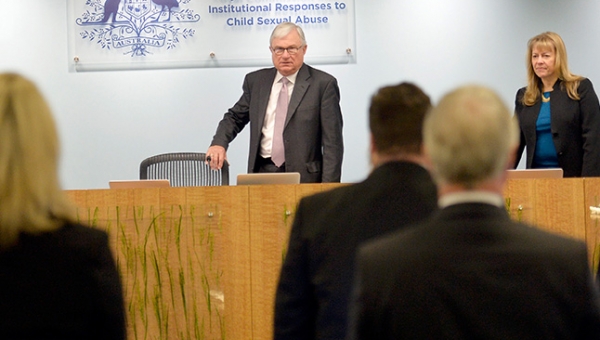
In providing an overview of the inquiry into Jehovah’s Witnesses the Child Abuse Royal Commission’s Final Report: Religious Institutions, Volume 16: Book 3, page 71, stated:
“In July 2015, the Royal Commission held a public hearing inquiring into the responses of the Jehovah’s Witness Church (Jehovah’s Witness organisation) and its corporation, the Watchtower Bible and Tract Society of Australia Ltd (Watchtower Australia), to allegations, reports or complaints of child sexual abuse. The case study explored in detail:
-
-
-
- “the experiences of two survivors of child sexual abuse in the Jehovah’s Witness organisation and the response of the organisation to the survivors’ complaints
- “the systems, policies and procedures in place in the Jehovah’s Witness organisation for raising and responding to allegations of child sexual abuse and for the prevention of child sexual abuse within the organisation.
-
-
“Our findings are set out in the report on Case Study 29: The response of the Jehovah’s Witnesses and Watchtower Bible and Tract Society of Australia Ltd to allegations of child sexual abuse (Jehovah’s Witnesses), which was published in October 2016.
“In March 2017 we held a further public hearing in relation to the Jehovah’s Witness organisation in Case Study 54: Institutional review of Church of the Jehovah’s Witnesses and its corporation, the Watchtower Bible and Tract Society of Australia (Institutional review of the Jehovah’s Witnesses). This hearing provided the Jehovah’s Witness organisation with an opportunity to inform us of its current policies and procedures in relation to child protection and child safe standards, including responding to allegations of child sexual abuse.
“In addition to the matters examined in the Jehovah’s Witnesses case study and Institutional review of the Jehovah’s Witnesses hearing, as of 31 May 2017 we had heard in private sessions from 70 survivors who told us about child sexual abuse in the Jehovah’s Witness organisation.” © Commonwealth of Australia 2017
As part of the preparation for the Jehovah’s Witnesses public hearing, the Child Abuse Royal Commission compelled Watchtower Australia under subpoena to produce its child sexual abuse database and all documents relating to allegations of child sexual abuse. Watchtower Australia produced about 5,000 documents, which included case files pertaining to 1,006 alleged perpetrators of child sexual abuse within the religion in Australia. The Child Abuse Royal Commission analysed the files and produced a data base summary of all 1006 cases, of which were mostly uncontested by Watchtower Australia.
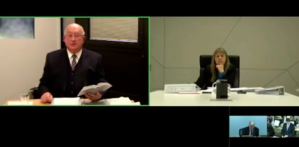
The public hearings into Jehovah’s Witnesses were held in Sydney from Monday 27 July to Wednesday 5 August. On 10 August 2015 the Child Abuse Royal Commission issued a media release stating that it anticipates that on 14 August 2015 the inquiry will hear from Jehovah’s Witnesses governing body member, Geoffrey Jackson. Jackson appeared via video link from Toowoomba, Queensland, and was compelled to answer questions under oath.
“The public hearing of Case Study 29: The response of the Jehovah’s Witnesses and Watchtower Bible and Tract Society of Australia Ltd to allegations of child sexual abuse was the most streamed hearing abroad, with a total of 22,073 views over the course of 21 days. This included over 3,000 views from the USA, and just over 600 views from Canada.” – Final Report: Our Inquiry Volume 1, p. 55.
On 28 November 2016 the Child Abuse Royal Commission tabled its damning report on the response of the Jehovah’s Witnesses and Watchtower Bible and Tract Society of Australia Ltd to allegations of child sexual abuse.
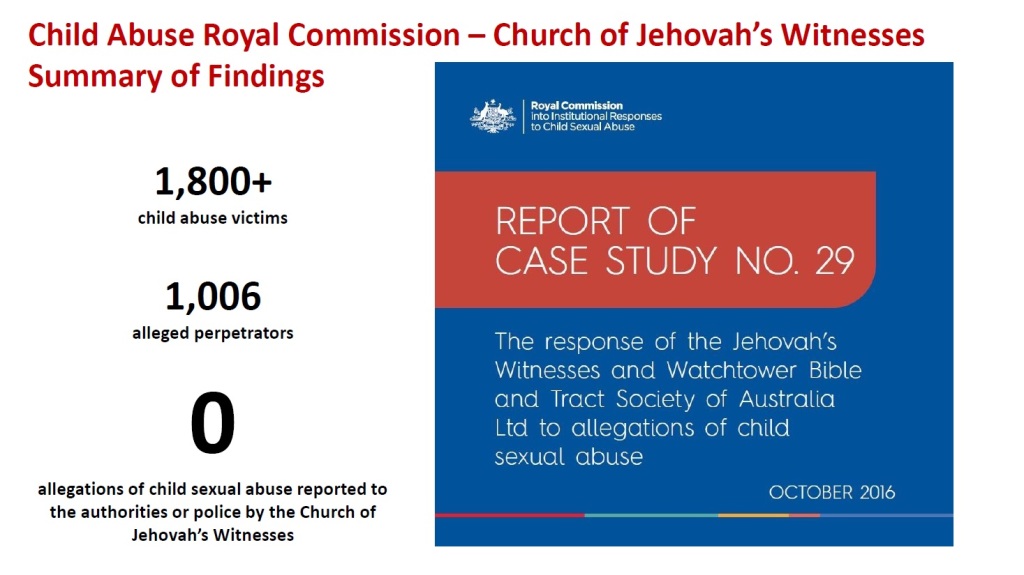
The Child Abuse Royal Commission, in its Final Report, stated that it clearly found a connection between child sexual abuse and the activities of the Jehovah’s Witness organisation, despite the claim by Watchtower Australia there is no connection.
“We did not, and still do not, accept that the child sexual abuse revealed in our Jehovah’s Witnesses case study has no connection with the activities of the Jehovah’s Witness organisation.” – Final Report: Religious Institutions, Volume 16: Book 3, p. 80.
As part of the evidence in proof the Child Abuse Royal Commission published the entire list of exhibits, submissions, transcripts and related documents for Case Study 29. All these documents are available to download as one single file on the link below.
Child Abuse Royal Commission into Jehovah’s Witnesses MASTER FILE (zip file) 802mb
On 10 March 2017 the Child Abuse Royal Commission held a second case study into Jehovah’s Witnesses.
Child Abuse Royal Commission Case Study 54 into Jehovah’s Witnesses (zip file) 18mb
National Apology to Victims and Survivors of Institutional Child Sexual Abuse
One of the recommendations of the Child Abuse Royal Commission was the issuing of a National Apology to victims and survivors of institutional child sexual abuse.
On Monday, 22 October 2018, the Australian Government issued a formal apology to victims and survivors of institutional child sexual abuse. Included within the apology were the words ‘we say sorry’.
“We say sorry. To the children we failed, sorry.” – The Hon Scott Morrison MP, Prime Minister of Australia, delivering the National Apology
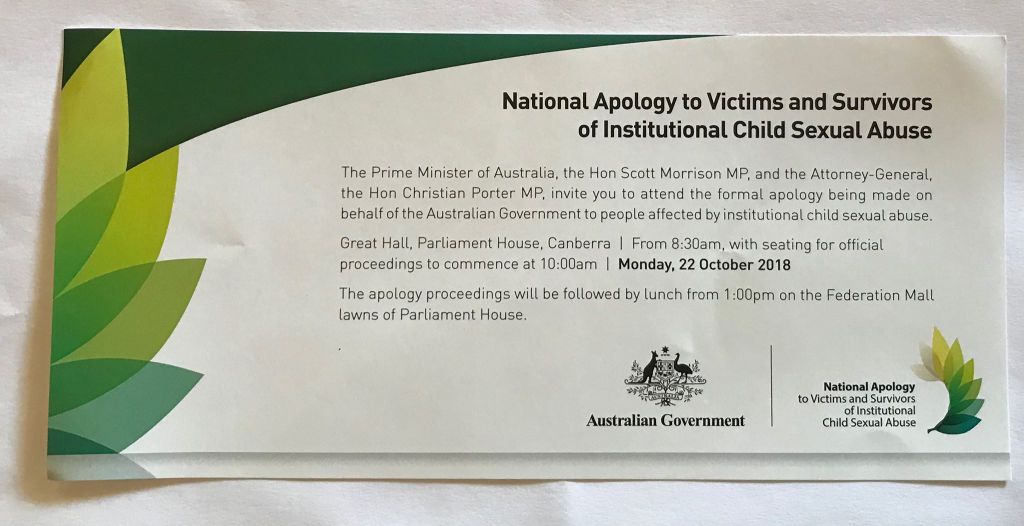
Among those invited to the National Apology were former members of Jehovah’s Witnesses – all being child sexual abuse survivors from within the institution, including the Say Sorry team.
Other institutions, religious, secular, and governmental, also issued formal apologies to the children they also failed to believe or protect. Notably absent was any apology by the Governing Body of Jehovah’s Witnesses, or from the Jehovah’s Witnesses organisation in Australia, or from the Watch Tower Society.
In the lead up to the National Apology, some ten weeks earlier, on Sunday 12 August 2018, a Resolution was adopted and formally read out during the 2018 JW Protest in London. Item 10 of the Resolution stated:
“We Invite the Governing Body of Jehovah’s Witnesses to ‘Be Courageous’! and ‘Say Sorry’! to all child abuse victims from within the Jehovah’s Witnesses, past and present, some of whom are here today adopting this resolution, so that they and us may heal as we still hurt.”
The invitation to ‘say sorry’ was rejected by the Governing Body of Jehovah’s Witnesses.
For further reading on the National Apology see the Say Sorry blog: National Apology to Victims and Survivors of Institutional Child Sexual Abuse.
“Why Is It So Hard to Apologize? A lack of concern for other people’s feelings may be another reason why some hesitate to apologize. They may reason, ‘Apologizing will not undo the blunder I have already made.’ Still others hesitate to say that they are sorry because of the possible consequences. They wonder, ‘Will I be held responsible and be asked to make compensation?’ However, the biggest hurdle to admitting a mistake is pride. A person who is too proud to say “I am sorry” may in essence conclude, ‘I don’t want to lose face by admitting my blunder. That would weaken my position.’” – The Watchtower magazine, November 1, 2002, p. 4, published by Jehovah’s Witnesses.
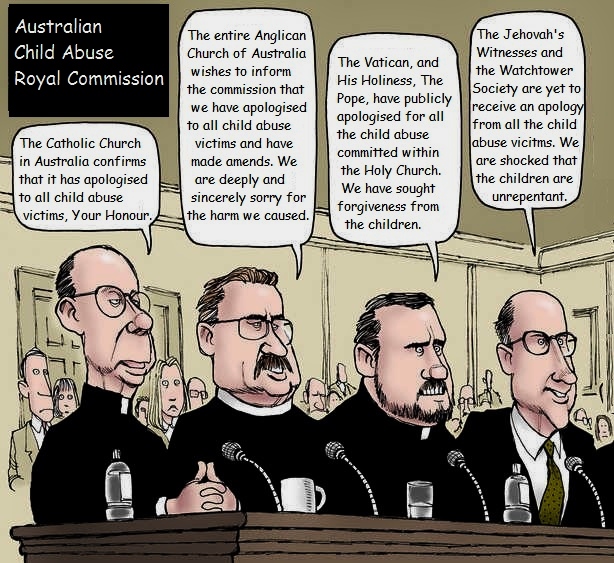
The Child Abuse Royal Commission’s criticism of the Jehovah’s Witnesses organisation
The Child Abuse Royal Commission was tasked with the responsibility to investigate the Jehovah’s Witnesses organisation and make findings and recommendations.
“The Royal Commission must make findings and recommendations to better protect children against sexual abuse and alleviate the impact of abuse on children when it occurs.” – Report of Case Study No. 29: The response of the Jehovah’s Witnesses and Watchtower Bible and Tract Society of Australia Ltd to allegations of child sexual abuse, p. 4.
“In the Jehovah’s Witnesses case study report we concluded that the Jehovah’s Witness organisation did not respond adequately to child sexual abuse. Further, we found that children in the organisation were not adequately protected from the risk of sexual abuse.” – Final Report: Religious Institutions, Volume 16: Book 3, p. 99.
“[T]here were a number of fundamental problems with the response of the Jehovah’s Witness organisation to allegations of child sexual abuse. Our inquiry into that response led us to conclude that policies and procedures relevant to child sexual abuse are firmly located in the Jehovah’s Witnesses’ beliefs and practices … We consider that the application of inflexible, scripture-based policies and practices, which are, by and large, inappropriate and unsuitable for application in cases of child sexual abuse, is a central contributor to the inadequate institutional responses to allegations of child sexual abuse by the Jehovah’s Witness organisation. The organisation’s retention and continued application of these policies and practices shows a serious lack of understanding of the nature of child sexual abuse.” – Ibid, p. 100.
“In the Jehovah’s Witnesses case study, we found that the organisation … had not developed precautionary measures for dealing with known or alleged perpetrators of child sexual abuse. This suggested a serious lack of understanding on the part of the Jehovah’s Witness organisation about the nature of child sexual abuse and the risk of reoffending. It placed children in the organisation at significant risk of sexual abuse.” – Ibid, p. 103.
In the conclusion of its report and findings into the Jehovah’s Witnesses organisation the Child Abuse Royal Commission wrote:
“Having regard to the various matters we have discussed in this report, we have reached a number of general conclusions on the Jehovah’s Witness organisation’s response to the sexual abuse of children.
“We do not consider the Jehovah’s Witness organisation to be an organisation which responds adequately to child sexual abuse. We do not believe that children are adequately protected from the risk of sexual abuse for the following reasons:
-
-
- “The organisation relies on outdated policies and practices to respond to allegations of child sexual abuse. Also, those policies and practices are not subject to ongoing and continuous review. The policies and practices are, by and large, wholly inappropriate and unsuitable for application in cases of child sexual abuse. The organisation’s retention and continued application of policies such as the two-witness rule in cases of child sexual abuse shows a serious lack of understanding of the nature of child sexual abuse.
- The organisation’s internal disciplinary system for addressing complaints of child sexual abuse is not child or survivor focused in that it is presided over by males and offers a survivor little or no choice about how their complaint is addressed.
- The sanctions available within the organisation’s internal disciplinary system are weak and leave perpetrators of child sexual abuse at large in the organisation and the community.
- In deciding the sanctions to impose and/or precautions to take in relation to a known or suspected perpetrator, the organisation has inadequate regard to the risk that that perpetrator might reoffend. This demonstrates a serious lack of understanding of the nature and impact of child sexual abuse.
- The organisation’s general practice of not reporting serious instances of child sexual abuse to police or authorities – in particular, where the complainant is a child – demonstrates a serious failure by the organisation to provide for the safety and protection of children in the organisation and in the community.”
-
– Report of Case Study No. 29: The response of the Jehovah’s Witnesses and Watchtower Bible and Tract Society of Australia Ltd to allegations of child sexual abuse, p. 77.
The Child Abuse Royal Commission’s recommendations to the Jehovah’s Witness organisation
The Child Abuse Royal Commission’s Final Report Recommendations advised all institutions that they should “uphold the rights of the child. Consistent with Article 3 of the United Nations Convention on the Rights of the Child, all institutions should act with the best interests of the child as a primary consideration. In order to achieve this, institutions should implement the Child Safe Standards identified by the Royal Commission.”
The Child Safe Standards are:
-
-
- Child safety is embedded in institutional leadership, governance and culture
- Children participate in decisions affecting them and are taken seriously
- Families and communities are informed and involved
- Equity is upheld and diverse needs are taken into account
- People working with children are suitable and supported
- Processes to respond to complaints of child sexual abuse are child focused
- Staff are equipped with the knowledge, skills and awareness to keep children safe through continual education and training
- Physical and online environments minimise the opportunity for abuse to occur
- Implementation of the Child Safe Standards is continuously reviewed and improved
- Policies and procedures document how the institution is child safe.
-
In addition to the above, the Child Abuse Royal Commission on page 55 of its Final Report Recommendations made three very specific recommendations to the Jehovah’s Witness organisation as shown in Table 1 below.
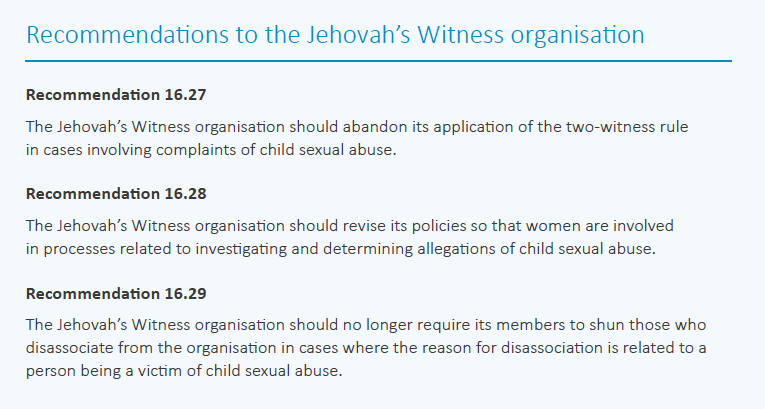
The Jehovah’s Witness organisation has refused to adopt any of the Child Abuse Royal Commission’s recommendations and until it does so “will remain an organisation that fails to protect children.”
“We considered a number of factors that may have contributed to the occurrence of child sexual abuse in religious institutions or to inadequate institutional responses to such abuse. The Jehovah’s Witness organisation addresses child sexual abuse in accordance with scriptural direction, relying on a literal interpretation of the Bible and 1st century principles to set practice, policy and procedure. These include the two-witness rule, the principle of male headship, the sanctions of reproval and disfellowshipping, and the practice of shunning. We consider that as long as the Jehovah’s Witness organisation continues to apply these practices in its response to allegations of child sexual abuse, it will remain an organisation that fails to protect children and does not respond adequately to child sexual abuse.” – Final Report: Religious Institutions, Volume 16: Book 3, p. 108.